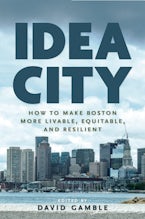
Idea City
How to Make Boston More Livable, Equitable, and Resilient
Published by: University of Massachusetts Press
318 Pages, 6.00 x 9.00 x 0.80 in, 56 illus.
Other Retailers:

Edited by David Gamble
Published by: University of Massachusetts Press
318 Pages, 6.00 x 9.00 x 0.80 in, 56 illus.
Other Retailers:
Racial strife, increased social and economic discrimination, amplified political friction, and growing uncertainty around the impacts of the COVID-19 pandemic and climate change have laid bare many inequalities within the city of Boston. How will these disruptions and inequities influence the city's future, especially as Boston celebrates its quadricentennial in 2030?
This collection of original essays addresses the many challenges Boston contends with in the twenty-first century and considers ways to improve the city for everyone. Presenting a range of perspectives written by area experts—academics, reflective practitioners, and policymakers—these essays tackle issues of resiliency, mobility, affordable housing, health outcomes, social equity, economic equality, zoning, regionalism, and more. Reflecting the diversity of the city and the challenges and opportunities Boston currently faces, Idea City will help readers think differently about their own areas of expertise and draw conclusions from urban regeneration work in other fields.
DAVID GAMBLE is principal of Gamble Associates and has taught at the Department of Urban Planning and Design at the Harvard Graduate School of Design, Syracuse University, and Northeastern University. He is coauthor of Rebuilding the American City: Design and Strategy for the 21st Century Urban Core.
“Gamble’s collection assembles diverse perspectives from well-known local changemakers representing various backgrounds and disciplines, with varying lengths of ‘tenure’ in Boston. These essays work together to succinctly summarize the failures of the past and present an alternate future. As a long-time student of Boston, and cities in general, I felt this book offered fresh insight.”—Katharine Lusk, executive director of the Boston University Initiative on Cities
This website uses cookies so that we can provide you with the best user experience possible. Cookie information is stored in your browser and performs functions such as recognising you when you return to our website and helping our team to understand which sections of the website you find most interesting and useful.
Strictly Necessary Cookie should be enabled at all times so that we can save your preferences for cookie settings.
If you disable this cookie, we will not be able to save your preferences. This means that every time you visit this website you will need to enable or disable cookies again.
